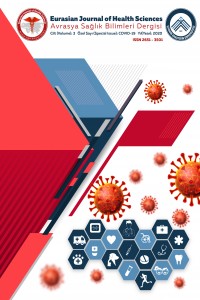Öz
Covid-19 is a disease caused by a new coronavirus strain.CO stands for “corona”, virus means “VI”, and the term Dstands for disease. This virus was normally known to date as a zoonosis. Unfortunately, in 2019, it has become avirus that has gained human-to-human transmission. The other problematic situation was that at first the effectsof the virus on new hosts ”human” had been unknown. Experience collected from day to day cases showed that thisvirus can be transmitted through contact, infectious material (such as respiratory droplets) or objects or surfacescontaminated by the causative virus. It is also characterized by fever, cough and shortness of breath, and has a morepronounced mortality risk in patients 65 years and older as a result of pneumonia and respiratory failure. Consideringsurgical site infections and hospital infections, it is essential to take separate measures and approaches in thesurgical departments for Covid-19, and now we will take a brief look at them.
Anahtar Kelimeler
Kaynakça
- China NHCo. (2020) New corona virus pneumonia preventionand control program (7th). Erişim Adresi: http://www.nhc.gov.cn/yzygj/s7653p/202003/46c9294a7dfe4cef80dc7f5912eb1989/files/ ce3e6945832a438eaae415350a8ce964.pdf.
- Coccolini F, Perrone G, Chiarugi M, et al. (2020). Surgeryin COVID-19 patients: Operational directives. World JEmergSurg. 7;15(1):25. https://doi.org/10.1186/s13017-020-00307-2.
- Daithi S. Heffernan, Heather L. Evans, Jared M. Huston etal. (2020). Reviews. Surgical Infection Society Guidancefor Operative and Peri-Operative Care of Adult PatientsInfectedbythe Severe Acute Respiratory SyndromeCoronavirus-2 (SARS-CoV-2). Surgical Infections. 21(4) .DOI: 10.1089/sur.2020.101.
- Lan Zhu, Nianqiao Gong, Bin Liu et al. (2020). Corona virusDisease 2019 Pneumonia in Immunosuppressed RenalTransplant Recipients: A Summary of 10 Confirmed Casesin Wuhan, China. EurUrol. 77(6): 748–754. DOI: 10.1016/j.eururo.2020.03.039.
- Setti L. Passarini F. , De Gennaro G. et al. (2020). AirborneTransmission Route of COVID-19: Why 2 Meters/6 Feetof Inter-Personal. DistanceCould Not Be Enough. Int.J. Environ. Res. PublicHealth,17(8), 2932. DOI: 10.3390/ijerph17082932.
- Shang L, Zhao J, Hu Y, Du R, Cao B. (2020). On theuseof corticosteroids for 2019-n CoVpneumonia.Lancet;395:683–684. DOI: 10.1016/S0140-6736(20)30361-5.
- Stacy A Brethauer, Benjamin K Poulose, Bradley J Needlemanet al.(2020). Redesigning a Department of Surgery duringthe COVID-19 Pandemic. J Gastrointest Surg28;1-8. DOI:10.1007/s11605-020-04608-4.
- Wu Z. , McGoogan J.M. (2020). Characteristics of andimportant lessons from the corona virus disease 2019(COVID-19) outbreak in China: summary of a report of72314 cases from the Chinese Center for Disease ControlandPrevention. Journal of American Medical Association(JAMA). DOI:10.1001/jama.2020.2648.
Öz
Covid-19, yeni bir koronavirüs suşunun neden olduğu bir hastalıktır ve CO, “korona” anlamına gelir, virüs “VI” anlamınagelir ve D terimi ise hastalık terimi anlamına gelir. Bu virüs normalde bugüne kadar bir zoonoz olarak bilinirdi. Ne yazıkki 2019 ‘da artık insandan insan bulaş özelliği kazanmış bir virüs haline geldi. Öteki sıkıntılı durumsa başlarda hiçbirşekilde virüsün yeni konak olana insana ve konak konumundaki insanın birbirlerine olan etkilerini tam kestirilmesininne olduğunun bilinmemesiydi. Gün ve gün olgulardan toplanan deneyimler, bu virüsün neden olduğu hafif ila şiddetlisolunum yolu hastalığı, bulaşıcı materyal (solunum damlacıkları gibi) veya nedensel virüs tarafından kontamineolan nesneler veya yüzeylerle temas yoluyla bulaşabildiğini gösterdi. Ayrıca özellikle ateş, öksürük ve nefes darlığıile karakterizedir ve zatürree ve solunum yetmezliği sonucu 65 yaş ve üzeri hastalarda daha belirgin bir mortaliteyapma riskine sahiptir. Cerrahi alan enfeksiyonları ve hastane enfeksiyonları göz önüne alındığında Covid-19 içincerrahi departmanlarda ayrı önlem ve yaklaşımların alınması elzem olup bu derlemede bu konuda bilgi verilmesiamaçlanmıştır.
Destekleyen Kurum
Yoktur
Teşekkür
Dünya gündemini sarsan bu pandemi etkeninin yaşamın her alanında olduğu gibi esas sağlık sistemindeki etkileri ki cerrahi uygulamalar açısından çok daha önemli bir özellik arzetmekte olduğu için bu derlemenin okuyucuyla buluşması gerçekleşirse bunda katkısı olan dergi editöryal kuruluna teşekkürlerimizi sunarız.
Kaynakça
- China NHCo. (2020) New corona virus pneumonia preventionand control program (7th). Erişim Adresi: http://www.nhc.gov.cn/yzygj/s7653p/202003/46c9294a7dfe4cef80dc7f5912eb1989/files/ ce3e6945832a438eaae415350a8ce964.pdf.
- Coccolini F, Perrone G, Chiarugi M, et al. (2020). Surgeryin COVID-19 patients: Operational directives. World JEmergSurg. 7;15(1):25. https://doi.org/10.1186/s13017-020-00307-2.
- Daithi S. Heffernan, Heather L. Evans, Jared M. Huston etal. (2020). Reviews. Surgical Infection Society Guidancefor Operative and Peri-Operative Care of Adult PatientsInfectedbythe Severe Acute Respiratory SyndromeCoronavirus-2 (SARS-CoV-2). Surgical Infections. 21(4) .DOI: 10.1089/sur.2020.101.
- Lan Zhu, Nianqiao Gong, Bin Liu et al. (2020). Corona virusDisease 2019 Pneumonia in Immunosuppressed RenalTransplant Recipients: A Summary of 10 Confirmed Casesin Wuhan, China. EurUrol. 77(6): 748–754. DOI: 10.1016/j.eururo.2020.03.039.
- Setti L. Passarini F. , De Gennaro G. et al. (2020). AirborneTransmission Route of COVID-19: Why 2 Meters/6 Feetof Inter-Personal. DistanceCould Not Be Enough. Int.J. Environ. Res. PublicHealth,17(8), 2932. DOI: 10.3390/ijerph17082932.
- Shang L, Zhao J, Hu Y, Du R, Cao B. (2020). On theuseof corticosteroids for 2019-n CoVpneumonia.Lancet;395:683–684. DOI: 10.1016/S0140-6736(20)30361-5.
- Stacy A Brethauer, Benjamin K Poulose, Bradley J Needlemanet al.(2020). Redesigning a Department of Surgery duringthe COVID-19 Pandemic. J Gastrointest Surg28;1-8. DOI:10.1007/s11605-020-04608-4.
- Wu Z. , McGoogan J.M. (2020). Characteristics of andimportant lessons from the corona virus disease 2019(COVID-19) outbreak in China: summary of a report of72314 cases from the Chinese Center for Disease ControlandPrevention. Journal of American Medical Association(JAMA). DOI:10.1001/jama.2020.2648.
Ayrıntılar
| Birincil Dil | Türkçe |
|---|---|
| Konular | Sağlık Kurumları Yönetimi |
| Bölüm | Araştırma Makaleleri |
| Yazarlar | |
| Yayımlanma Tarihi | 13 Temmuz 2020 |
| Gönderilme Tarihi | 25 Haziran 2020 |
| Yayımlandığı Sayı | Yıl 2020 Cilt: 3 Sayı: COVID-19 |

